 It's official (and slightly mad) this moths Words From a Bench project is live in both Rowntree Park and Reykjavik, Iceland. The project is a avenue for new and emerging writers to get their short stories and poetry into the heart of the cities. I have now been published by the great folks who run the Rowntree's project (Cath Mortimer, blogger and Karen Green, editor) four times and am ecstatic that my writing will now be extending to Iceland. Lets hope for a spike in international book sales!?! :p You can find out more about the project at my project page and from the pages linked above. Please go take a look at the writing. I am joined by some amazing authors, including:
0 Comments
I've been invited, by fellow writer Adam M Booth, to take part in the 'my writing process blog tour'. This is a great little project where writers nominate each other to respond to four question about their current projects and process. It's a great way for readers and writers to get into the mind of their favourite novelists, glean some tips on the writing process and find out what people are currently writing. 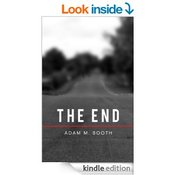 So firstly, huge thanks to Adam for inviting me. Go check out his answers from last week and while your there take a look at his novella 'The End'. It's an incredibly gripping and dark zombie horror, written from the zombie's perspective. And its only 77p for kindle. You'd be stupid not to grab it. (Link right). Next week you'll be able to read the responses from Adrian P Fayter, Phil Lickley and N.E.David - So make sure you take a look at there posts next week. Who knows you might just find the big seller of the future, your favourite book of the year or grab a tip that helps you complete your next masterpiece - More on them at the end of my blog. So here goes... What Are You Currently Working On?At the moment I am working on my second novel. Unlike Life Without the title is giving me hell and is not surfacing at the moment, so for now I'll refer to it as Death of the Artist (this may change). It's a story about a young girl, Tillie, who is trying to find the studio of her artistic hero, David Lanzer. David is a successful, but haunted artist. All his works are part of larger series and he is entrenched in his art and his process. (I'm finding this oddly relevant to the interview!? He's not me honest!? :p). Early in the story Tillie finds David's studio and decides to break in, moments later David walks through the door. Now flung together these two obsessive personalities go on a brief, relationship forging, journey. I won't say too much more but it certainly doesn't have Life Without's happy ending. I have also sent off a flurry of short stories to a number of different places recently. One that I am really hoping will pay off is a new entry to the Rowntree's Park, Words From a Bench project. I've been published by the project twice now and this round the successful pieces will go live in a a park in Iceland as well as in York. Very cool! You can read my November and February entries at the wordpress site. How Does Your Work Differ From Others Of Its Genre?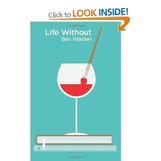 I always try to put a little twist on the stories I write to make them individual. Life Without was slightly different to other in the romance genre because it was written from a male perspective. I get a lot of comments about this balance, which readers seem to really notice. I didn't really aim to carry a message through the book but I suppose it balances a genre where males are usually strong characters and females are portrayed as being damaged in some way and world apart from other characters. Death of the Artist (as I'll call it for now) is actually a totally different genre. It is effectively a thriller but it masquerades as a romance for a majority of the story. I think this is what will make it unique when it's finished and (hopefully) make it an interesting and original piece. Why Do You Write What You Do?I write a lot of different thing; different genres and also different formats. I started as a scriptwriter and still enjoy writing for screen, stage and radio, as well as writing short stories and novels. I also write songs, though that's more of a hobby. I have always said that I love storytelling; I find it fascinating that people construct their world through narratives. We tell each other jokes, put a spin on our experience of the day and more and more we constantly convert our lives into stories. New media has a big influence on this and so many of us now create stories through blogs, Facebook posts, tweets, Snapchat pictures, YouTube videos, the list goes on. I write what I do because I have an internal drive to share stories and I feel very privileged when someone takes time away from their lives to immerse themselves in something I have written. It sounds very cliche, but it really is just part of who I am. How Does Your Writing Process Work?I am all about structure and research. I don't think any story can just come about. Stories should be understood; characters have to be thought through and everything written should be pushing towards the goal that is the end of the story. It's a bit like a joke; you might embellish it to bring it to life but every word is forging towards that punch line. Stories for me should have that same sense of direction. 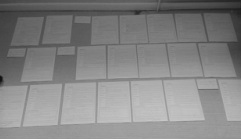 All my scene cards on the floor All my scene cards on the floor When I'm writing I'll firstly try and put my idea into a couple of paragraphs. What I'm trying to do at that point is work out a rough map for the beginning, middle and end of my story. I think it's really important to do this because those steps of a story are ingrained in us as a culture and it's amazing how many new writers get it wrong. So I write a paragraph or two, which aim to introduce the characters. Not just say 'this is David' but to tell us who David is. Is he a brat, a rich but lonely entrepreneur, a salesman who is rubbish at his job. Then that paragraph needs to tell me what they want, what is going to get in the way and what ending I am coming to. With that rough shape in mind I then start to flesh out the characters more. Who they are as a whole; what are their quirks; where do they live; where have they come from? I sometimes do little exercises to get these characters concrete in my mind, like writing down their hopes, fears, relationship with others or reading a newspaper article and trying to workout how they would react to what's been written. Finally, before writing, I'll try to write a scene by scene breakdown of the story. I only generally start writing when I have all of this together and feel like I know the characters and the general journey of the story. Sometimes, if an idea is really fresh in my mind, I might just write. With Life Without it all just seemed to come, so I wrote the first five chapters and then I went back to the planning stages. Those five chapters actually became chapter 1,5,6,9 and 12 once I'd really thought it through. My current book, Death of the Artist, all hinges round the idea of obsession, so I've done a lot of psychological research. I read some of Freud's case studies and I tried to identify elements of a obsessive personality. I've then built this into my characters. For example, David has a whole back story about his upbringing that is purely designed to help me write him and understand what he would do in certain scenarios. I have no intention of putting the back-story in the finished book. Writing in this very structured way isn't for everyone but it really helps me write solid characters, which I'm often complimented for. It also helps me start and finish a book, which is a big challenge. A lot of potential writers out there have a great idea but never finish it. To them I say plan it out, stick to your plan and you'll get there. Once you've got a finished article you can play. Take bits out, add now things in, shift things around. I suppose I find the editing process a lot more fun and creative than the original writing process. Making a start on a blank page is a challenge for everyone. So there you are. That is my writing process blog tour. Please feel free to comment and ask any questions. Its great to talk about process with fellow writers, no matter how long they've been doing it or what level they are at. I love to get involved so give me a shout. Next Monday: Adrian P Fayter, Phil Lickley and N.E.David will take their turn. Take a look. 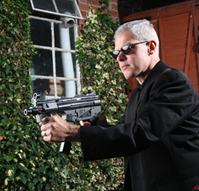 Adrian P Fayter, author of the Larry Di Palma series of crime novels. If you think crime books can't have a sense of humour, prepare to be proved very wrong! 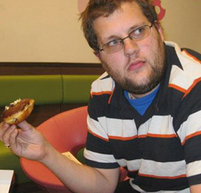 Phil Lickley, is a 28 year old manager at a Students' Union with a passion for music. Phil enjoy all sorts of writing but mainly writes reviews on musicians/music, gigs and theatre productions. He hopes to finish off a novel and some short stories, one day! 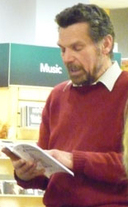 N.E.David, is the pen name of York author Nick David. Nick tried his hand at writing at the age of 21 but like so many things in life, it did not work out first time around. Following the death of his father in 2005, he took it up again and has been successful in having a series of short novellas published both in print and online. Besides being a regular contributor to Literary Festivals and open mics in the North East Region, Nick is also a founder member of York Authors and co-presenter of Book Talk on BBC Radio York. His debut novel, Birds of the Nile, is published by Roundfire. My guest today is Adrian P Fayter. Adrian is a crime fiction writer, who has recently released his first book Death Benefit. 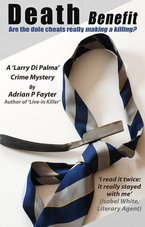 Ben: So firstly Adrian, congratulations on the publication of Death Benefit. I can honestly say it is the best self-published book I have read for some time. I'd call the book a crime thriller but it is a very different take from the standard cop drama. Can you tell us a bit about it? Adrian: Thanks, Ben, for your kind comments. I've been getting positive feedback from a wide variety of readers, and that’s a very encouraging thing for a writer. Death Benefit does follow certain crime writing conventions, but the protagonist/narrator, Larry Di Palma, works as a benefit fraud investigator. This allows me to create realistic investigation scenarios, but also means that Larry can stumble into danger in a believable way, because he doesn't have the same training or back-up team as a police detective. The book can be classed as a thriller, but it has a little less action than others in that genre. The atmosphere, characterisation and the cynical sense of humour of its narrator are all just as important to me. And there’s nothing less convincing than corpse after corpse appearing on the page...  Ben: So what made you want to write this style/genre. Are there any big influences that drew you in? Adrian: I’ve been writing for a very long time, and, as many of us do, I’ve experimented with poetry and short stories, and written an early, semi-autobiographical novel. Crime fiction is, broadly speaking, the biggest selling genre in the UK, so it made sense to consider moving in that direction with a view to getting published. But crucially, the result is a book written very much in my own voice, and saying things that I want to say. Readers may spot the influence of the earliest of Len Deighton’s spy novels in different aspects of the book; not least in the free gifts that come with purchases made directly from me or my website. Ben: Haha, yes indeed. So what is it about Len Deighton's novels that you like and is there any particular essence of them you've tried to capture in your own style? Adrian: His early books brilliantly describe the bureaucracy and office politics of espionage. They are also very funny and economical with their descriptions. I love the start of Billion Dollar Brain: ‘It was the morning of my hundredth birthday,’ is the perfect way to introduce the narrator’s hangover and the way he has let down his girlfriend the night before. The drab form-filling and the seedy locations such as the multi-storey car park in Death Benefit are there to create a sense of realism; locations and setting are important in the way a writer creates a mood or atmosphere. Ben: I was really impressed with the dialogue in your book and the characters as a whole. Larry Di Palma is a great character. It had me laughing out loud in a few places. Did you do any research or use any techniques to get these characters voices to come through so clear? Adrian: I remember in one of our MA classes we were talking about our characters, and I said that Larry had been with me for so many years that I couldn’t remember how he started out; however, he is basically me. And I think it’s true that a lot of his cynicism, and the conflict he feels between laziness and professionalism are present in my own character. Other readers have asked me about research I did in order to create a realistic setting and story. Well, years ago I worked in various roles in three different Jobcentres, and although I have altered some of the jargon and procedures, I think the result overall reflects nicely the bureaucratic world of benefit claims and benefit fraud. I’m pleased with the authenticity of the setting and characters, because any novel depends upon them, no matter whether literary or genre fiction. 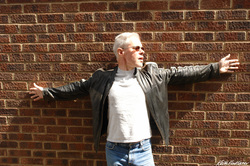 Ben: Tell us a bit more about your MA and experience. Would you suggest this route for other budding writers? Adrian: The feedback from fellow students and tutors can be invaluable, but it has to come at the right time for each individual writer. I think I benefited immensely from doing the MA course at York St John University because I was able to fine-tune a completed novel as well as present some new experimental work. The key is to start a degree or MA course when you are going to benefit the most from a lot of constructive criticism. That could be as a mature, experienced writer or as a complete beginner: it depends on the individual. Ben: You self-published your book with Matador. Can you tell us a little about that? Adrian: I had strong interest from three different literary agents, but ultimately none of them was successful in taking the book into a publishing deal. However, I have since become a bit of a convert to the idea of self-publishing, which offers many potential advantages to any writer. Ben: Wow, that's great. So what are these advantages that made you go with self-publishing and do you have any top tips for people considering self-publishing? Adrian: My top tips for self-publishing can be seen on my website, but the most important one is probably this: ‘Don’t be in too much of a hurry, don’t set unrealistic deadlines, and always consider quality of product over speed of publication.’ The processes of publishing, marketing and selling inevitably take up as much time as writing itself. For example, despite the fact that my completed manuscript had been reviewed by different literary agents and by my university tutor, I still ended up doing four further proof reads before I was happy to go to press. I really hope readers haven’t spotted any more typos in the final product! As to advantages, well, if I sell a book directly from my website, book launch or other event, I keep 100% of the cover price. If a publisher sells via a bookshop, I get about 30%. Ben: So the book you've released mentions a sequel - can you tell us anymore about the next Larry Di Palma adventure? Adrian: The next novel, Live-in Killer, is currently in preparation – a taster is given at the end of Death Benefit in both its printed and e-book forms. Readers can also find a short story (with the promise of more to come) at the Rowntree Park Words from a Bench project. Ben: Thanks so much for your time Adrian and all the best with the next novel. Adrian: Thanks, Ben, and happy writing to you, too! You can find more writing and information about Adrian at:
Website: http://crimebooks.wordpress.com (Buy paperback copies here, and learn about crime writing, self-publishing and more) Amazon: http://www.amazon.co.uk/Death-Benefit-Adrian-P-Fayter/ (Buy paperback, download for Kindle and read reviews here) |
AuthorBen Warden - Editor of the #SFFiction project and author of 'Life Without', which made the top ten literary fiction e-books on amazon. Categories
All
Blog Archive
January 2020
|


 RSS Feed
RSS Feed
